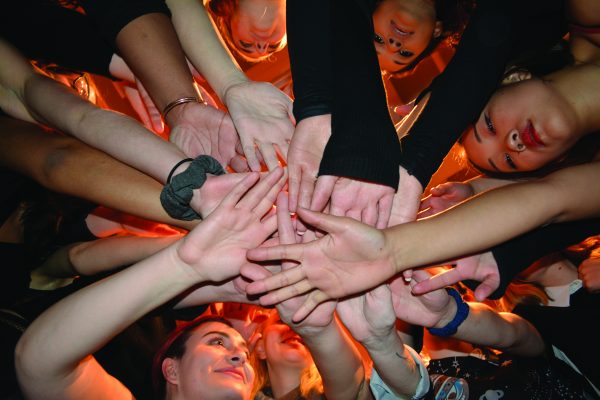Student Voices Featured in “Vag Mons”
The Vagina Monologues brings a progressive feminist message with speeches about the feminine experience. (Adriana Balsamo-Gallina/ The Observer).
May 4, 2017
Eleven years running, the student production of “The Vagina Monologues” has ushered in a new addition to the ever-changing performance. For the first time, Fordham’s staging, which ran from April 21-23, included a second act comprised of six original pieces written by Fordham students.
The directors, Desiree Ewing, Fordham College Lincoln Center (FCLC) ’17, and Alysha Kundanmal, FCLC ’17, believed that the additional monologues expanded the range of the show’s subject matter to be more inclusive across the board. The 21 monologues featured in Act I encompass a wide scope of perspectives and stories taken from the interviews of 200 women who gave their accounts of sexual and abusive experiences. Despite this, Ewing and Kundanmal felt there was room for improvement.
“Just the name ‘The Vagina Monologues’ is very cis-centered and sex-centered and we really wanted to expand it to include people of all genders,” Ewing said.
Joining traditional pieces like Hair, Because He Liked to Look at It and I Was There In the Room, the six new monologues, titled Lesser Lesbian, Pretty Takes Away, Unexplored Territory, Mi Tesorito, P Bi and J, and Caramel, incorporated unique perspectives from queer students, as well as students of color that “push the boundaries” of the original set list.
In Caramel, a student remembers “unfortunately, the most positive sexual experience she had in high school,” about a boy who told her that she was pretty, for an Indian. P Bi and J discusses how a student found it easier to identify as bisexual to friends than to come out as queer.
According to Kundanmal, one of the challenges that producing the Monologues at Fordham comes across every year is its overwhelmingly white female cast. In general, the actors in the performance do not resemble the actual authors of the monologues—an issue that is amplified in pieces written by Fordham students.
“I’m not about to write a story and tell an experience of something I haven’t gone through or don’t have firsthand experience. I don’t feel okay doing that for a work like this,” Kundanmal said.
From the moment it was created by Eve Ensler in 1996, the show has received a considerable amount of criticism, in particular about a monologue in which a thirteen-year-old woman of color describes having a positive sexual experience with a twenty-four-year-old neighbor while under the influence of alcohol. A new script that lists the young woman’s age as 16 has since been published, and is the version that Fordham’s production uses. Despite this, the Monologues are an unsanctioned event at the University; however, it is clear to Ewing and Kundanmal that “The Vagina Monologues” is a show so authentically courageous and compassionate that people are still catching up to it, 21 years later.
“As lots of people, especially Fordham students, know, Fordham has gone through a lot these last few years with issues of racism and sexism and homophobia and classism pervading college campuses everywhere, but definitely Fordham has seen it, which is so disturbing. And unfortunately, many students feel that the administration doesn’t address this well enough, and so this is one of the small ways that the women and nonbinary people of Fordham–students of Fordham–are able to sort of fight back against that. By hosting this show at Fordham, knowing that Fordham doesn’t sanction it, it’s sort of our way of saying, ‘we demand respect, and we want our voices to be heard,’” Ewing said.
Both directors agreed that the relationships that students build with each other is central to the production’s importance. During large rehearsals, the days ran much more like team-building seminars. Ewing and Kundanmal organize a check-in with everyone, going over names, pronouns and students’ highs and lows of the day. Every other week, the sessions involved a workshop that highlighted a particular theme of the Monologues such as sexual health and psychology and sexual abuse.
“This is so much more than just a show. The point of this show, besides conveying all of these important messages to the audience and sharing these stories, is about the community it builds of the people involved with it,” Kundanmal said.
Combined, Acts I and II of “The Vagina Monologues” illuminate what we talk about when we talk about vaginas; they are shells, flowers, black holes, tulips, red leather couches, freeways, obsessions; they are abstract and angry, green, chatty and unvisited; they wear silk kimonos and combat boots; they are oneself–sites of attention and great deliberate ignorance. And it is vastly important we talk about them.











